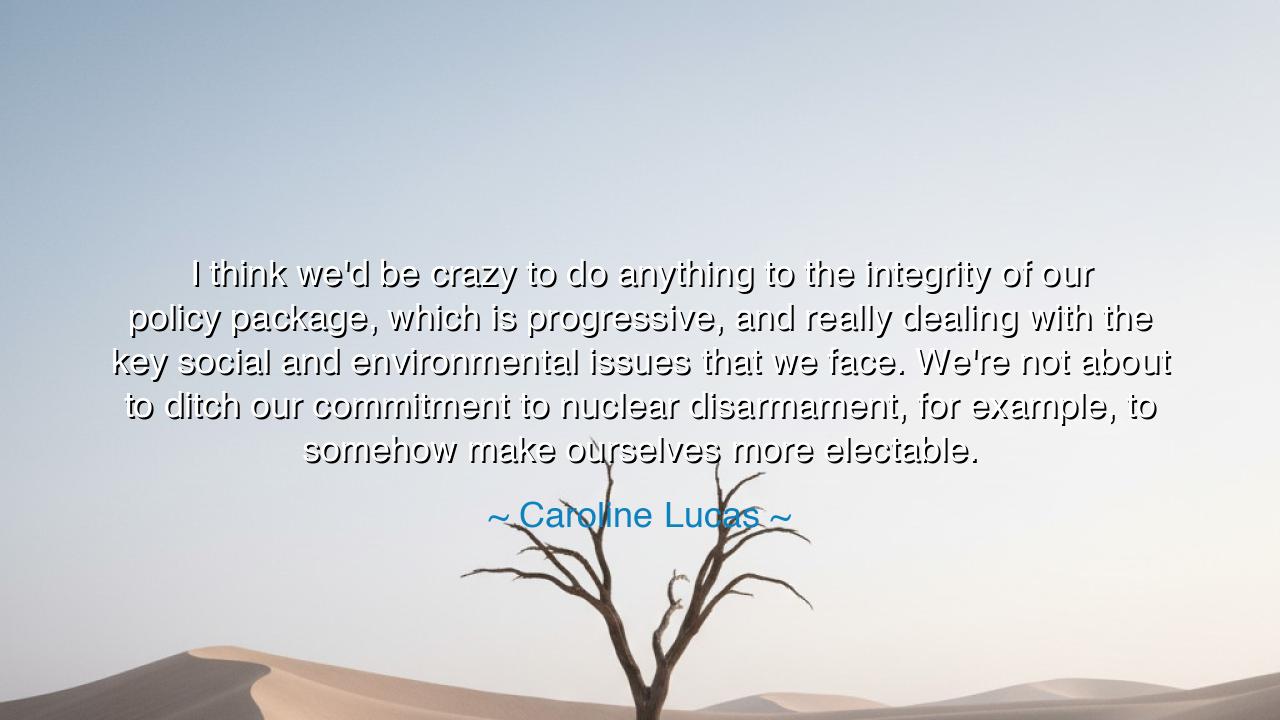
I think we'd be crazy to do anything to the integrity of our
I think we'd be crazy to do anything to the integrity of our policy package, which is progressive, and really dealing with the key social and environmental issues that we face. We're not about to ditch our commitment to nuclear disarmament, for example, to somehow make ourselves more electable.






In the words of Caroline Lucas: “I think we’d be crazy to do anything to the integrity of our policy package, which is progressive, and really dealing with the key social and environmental issues that we face. We’re not about to ditch our commitment to nuclear disarmament, for example, to somehow make ourselves more electable.” These words shine with defiance and principle, calling to mind the age-old struggle between integrity and expediency. They remind us that true leadership is not measured by the applause of the moment, but by fidelity to the higher truths that endure across generations.
The ancients knew well that temptation ever besets the ruler and the people alike: the temptation to abandon principle in pursuit of immediate power. In the Athenian assembly, men often swayed the crowd with easy promises, urging expedience over justice. Yet history remembers not those who bent with every breeze, but those who stood firm in the storm. Lucas declares that to surrender the heart of one’s mission for the fleeting prize of electability is not victory but surrender, not triumph but defeat in disguise.
Her reference to nuclear disarmament calls us to remember the gravest of human follies: the creation of weapons capable of annihilating all life. To hold fast to a vision of a world free of such instruments of doom is not naïveté, but courage. The voices of expedience may whisper: “Abandon this cause; it makes you weak; it will cost you votes.” Yet Lucas insists that to discard such a commitment for the sake of politics would be to barter away humanity’s very survival. The ancients would call this hubris—placing the hunger for power above the sanctity of life itself.
History itself gives us examples of this tension. Consider Cincinnatus, the Roman farmer who was called to serve as dictator in a time of crisis. He could have clung to power, reshaping laws for his own benefit, yet he chose instead to return to his plow, preserving his integrity and his people’s trust. Contrast this with leaders who traded principle for expedience, and whose names are remembered not with honor but with shame. Lucas’s words echo Cincinnatus’s example: the true measure of greatness is not what one gains, but what one refuses to betray.
The deeper meaning of her quote lies in the defense of progressive policies that tackle the great challenges of our time: justice for the poor, healing for the environment, peace among nations. To dilute these commitments in order to lure voters with easier promises would be to sacrifice the very soul of the movement. For what is the purpose of politics if not to change the world for the better? To seek office by abandoning principle is to arrive empty-handed at the very moment of triumph, having won power but lost meaning.
And yet, the lesson is not only for leaders of parties but for all who walk the path of life. Each of us faces moments when it is easier to abandon principle for convenience, to silence truth for comfort, to compromise conviction for gain. Lucas’s words call us to a higher path: to remember that integrity is the cornerstone of any endeavor worth pursuing. Without it, victories crumble, but with it, even small efforts shine with eternal worth.
So let this teaching endure: cling to your principles as the sailor clings to the stars for guidance. Do not cast them aside for the shifting winds of expedience, for a ship without a compass will soon be wrecked. In your own life, defend the truths you hold sacred—whether they be justice, peace, or care for the earth—even when others tell you it is impractical. For as the ancients taught, the noblest victories are not those that come easily, but those won by steadfast hearts who refused to trade their integrity for fleeting gain. And remember always: it is better to lose with honor than to win with betrayal.






AAdministratorAdministrator
Welcome, honored guests. Please leave a comment, we will respond soon